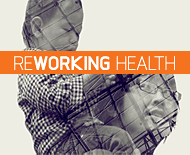Future Now
The IFTF Blog
Reworking Health: New Authorities in a Well-being Economy
A rapid explosion of tools and services, from microworking and crowdsourcing platforms to sensor technologies, is reshaping health and well-being. Health measurement and interventions no longer take place only in hospitals and traditional health spaces, but increasingly in workplaces and homes. The roles of patients, consumers, providers, and caregivers are shifting, creating opportunities for new health and well-being authorities to emerge. In this transforming landscape, the production of health knowledge and trusted sources for making health decisions will change. Individuals, organizations, and communities will need new models, skills, and capabilities to thrive.
 On June 12-13, our Health Horizons Program will explore these changes to health and well-being at our annual conference, Reworking Health: New Authorities in a Well-being Economy. At the conference, we’ll use our 2013 health map to understand how five converging forces—the expanding definitions of health and well-being, new technologies allowing ubiquitous health measurement in everyday activities, the surge of chronic diseases that require continuous care, abundant data, and increased community and social engagement platforms—are disrupting traditional relationships with doctors and other care providers. We’ll explore four sources of authority emerging from these drivers—computation, narrative, networks, and ambience—and identify skills that may be cultivated to activate these new authorities in the coming decade. Using the map and research-based forecasts as a guide, we’ll find inspiration to rework health, to imagine new systems of health and well-being now and in the future.
On June 12-13, our Health Horizons Program will explore these changes to health and well-being at our annual conference, Reworking Health: New Authorities in a Well-being Economy. At the conference, we’ll use our 2013 health map to understand how five converging forces—the expanding definitions of health and well-being, new technologies allowing ubiquitous health measurement in everyday activities, the surge of chronic diseases that require continuous care, abundant data, and increased community and social engagement platforms—are disrupting traditional relationships with doctors and other care providers. We’ll explore four sources of authority emerging from these drivers—computation, narrative, networks, and ambience—and identify skills that may be cultivated to activate these new authorities in the coming decade. Using the map and research-based forecasts as a guide, we’ll find inspiration to rework health, to imagine new systems of health and well-being now and in the future.
This event is not open to the public; however, you may follow the conference and join the discussion on the IFTF Facebook page and on Twitter at @IFTF and #reworkinghealth!
Conference Highlights
A workshop with James R. Doty, MD (@StanfordCCARE), Director and Founder of the Stanford School of Medicine Center for Compassion Research and Education, that will equip caregivers and others with neuroscience-based tools to practice mindfulness, mitigate or eliminate errors, and connect with patients—and oneself—in a compassionate way.
A medical clowning demonstration and talk with Wellington Nogueira (@wellnogueira), Founder of Doutores da Alegria (Doctors of Joy), who will explain how laughter is increasingly being integrated into care plans and trusted as an effective intervention in hospitals worldwide.
A discussion with IFTF Executive Director Marina Gorbis (@mgorbis) about her new book, The Nature of The Future: Dispatches from the Socialstructed World, which is about how new technologies are giving individuals power to connect and share resources in ways that are inventing radically new types of organizations and services, including news ways for health and well-being work.
A facilitated session with IFTF researchers and fellow participants to use the 2013 health map and research insights to develop action plans.
Panel Discussions
Rebalancing Machines and People—a discussion on the increasing ability to measure health at every scale and the need to balance human observation and technical augmentation with University of Wisconsin-Madison Professor and HealthSytems Lab’s Patricia Flatley Brennan, Jacob Scott (@CancerConnector) of the H. Lee Moffitt Cancer Center and Research Institute, Health Horizons Program Co-Director Miriam Avery (@myravery), and IFTF Research Assistant Sarah Smith (@ssmith15).
The Power of Unseen Influence—a discussion about the potential power of environmental interventions and the enabling technologies of networked matter for health and well-being with IFTF Technology Horizons Program Director Rod Falcon (@rodfalcon), All Natural: A Skeptic’s Quest for Health and Happiness in an Age of Ecological Anxiety author Nathanael Johnson (@SavorTooth), and Health Horizons Program Co-Director Bradley Kreit (@bkreit).
Treating Trauma in Caring Communities—a conversation with ACEsTooHigh.com Founder and Editor Jane Stevens, Peace4Tarpon.org Founding Director Robin Saenger, and IFTF Research Director Rachel Maguire about the link between trauma and adult onset chronic disease, and how networks can be leveraged for intervention.



